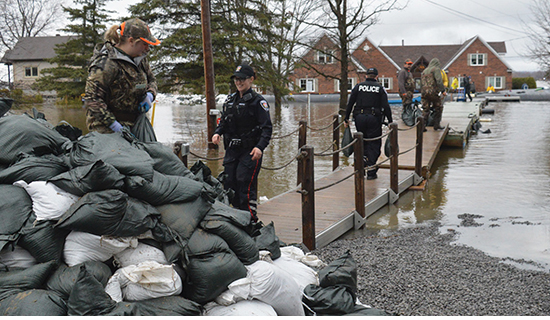Every spring, Cumberland residents living along the Ottawa River brace themselves for possible flooding which varies from year to year. For instance, 2022 was an average year for water levels along the Ottawa River, sparing residents the risk that their properties would experience any major flooding.
 |
| Residents living along the Ottawa River near Cumberland Village have started their annual flood watch hoping that they won’t experience a repeat of the major flooding they experienced in 2017 and 2019. STAFF PHOTO |
That wasn’t the case in either 2019 or 2017, when residents living along the river near Cumberland Village experienced devastating floods and tens of thousands of dollars in damages.
So when the Rideau Valley Conservation Authority (RVCA) recently issued a Flood Outlook Statement for the Lower Ottawa River Valley forecasting that minor flooding may occur in low-lying areas along the Lower Ottawa River generally susceptible to flooding, you can understand why they might raise the level of concern. It all depends on how gradual the current snow pack melts, especially upstream around Deep River and Pembroke, and how much rain we get.
“Based on forecasted higher temperatures and anticipated snow melt, levels and flows along the Ottawa River are expected to increase over the next few days in the Ottawa River basin,” the RCVA announced in an advisory released on the weekend.
But the RCVA stopped short of attempting to quantify any potential flooding.
“While there are currently no flooding indicators of concern, it is still too early to forecast peak river conditions which remain dependent on snowmelt and rainfall amounts,” they further stated.
Snow pack levels are especially high at this time of year as compared to previous years. A sudden increase in temperature expected this week will hasten the melting process and lead to a sudden increase in water levels on the tributaries that feed into the Ottawa River and the Ottawa River itself.
But that alone may not cause any flooding. The other issue is that the average daily temperatures up until this week have not been high enough to thaw the ground in any significant manner. If the ground doesn’t thaw fast enough it won’t be able to absorb the snowmelt or any precipitation should the area get a significant amount of rainfall in the coming days and weeks.
Those are the circumstances that lead to the “flood of the century” in 2019.
If you believe the latest statement from the Rideau Valley Conservation Authority the threat, at least for now, is still relatively low. But the same statements were issued in both 2017 and 2019 before a significant amount of rain added to the snowmelt and raised the level of the Ottawa River past what would be considered normal for this time of year, flooding their properties.